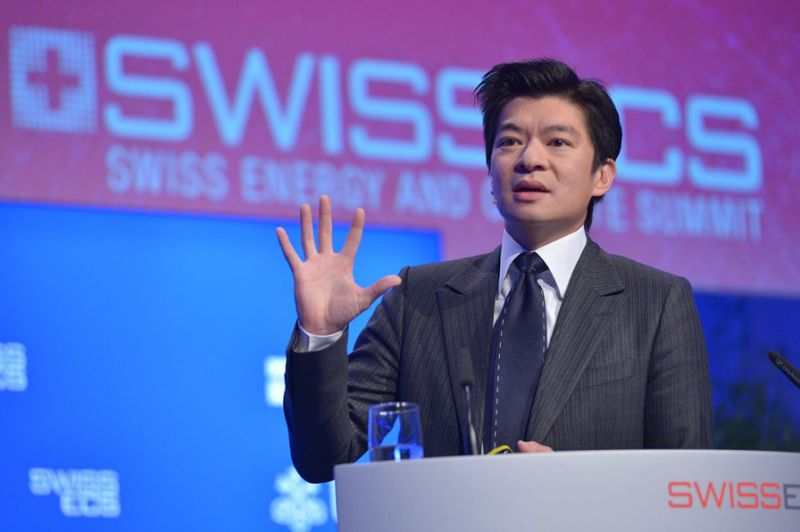
<p class="canvas-atom canvas-text Mb(1.0em) Mb(0)–sm Mt(0.8em)–sm" type="text" content="By IPO Edge Staff” data-reactid=”19″>By IPO Edge Staff
<p class="canvas-atom canvas-text Mb(1.0em) Mb(0)–sm Mt(0.8em)–sm" type="text" content="The climate has long been a hot button topic for politicians and activists, and it is becoming one for investors too. Millennials, now the largest demographic in the United States, are far more likely to choose products, services, companies, and candidates that reduce damage to the environment – or better yet, improve it. In 2018, sustainability-related products grew faster than their conventional counterparts in more than 90 percent of Consumer Packaged Goods product categories.” data-reactid=”20″>The climate has long been a hot button topic for politicians and activists, and it is becoming one for investors too. Millennials, now the largest demographic in the United States, are far more likely to choose products, services, companies, and candidates that reduce damage to the environment – or better yet, improve it. In 2018, sustainability-related products grew faster than their conventional counterparts in more than 90 percent of Consumer Packaged Goods product categories.
Environmental advocates are growing more and more concerned, calling attention to the ways the changing climate is damaging wildlife, the world’s most pristine spaces, and the future we are creating for the next generation. The public is starting to listen. Positive climate impact is moving from a “nice to have” to a “must have” characteristic of businesses.
It’s no surprise, then, that entrepreneurs are following suit. Venture capitalists jumping on board, and just as we have FinTech, AdTech, AgTech, and FoodTech – VCs are betting that “ClimateTech” will soon join these emerging and established markets.
<p class="canvas-atom canvas-text Mb(1.0em) Mb(0)–sm Mt(0.8em)–sm" type="text" content="That’s the aim of veteran venture capitalist Andrew Chung’s 1955 Capital, a firm he created to foster technologies in developed countries that can be rapidly commercialized and scaled to solve pressing challenges in the developing world, especially in China. A true serial entrepreneur, Chung started his first company while still at Harvard. After stints at Bain Capital, Lightspeed Ventures, and Khosla Ventures–where he launched a series of ClimateTech businesses over the past 15 years—he and 1955 are armed with more than $200 million in capital commitments to connect new companies with the world’s largest markets.” data-reactid=”23″>That’s the aim of veteran venture capitalist Andrew Chung’s 1955 Capital, a firm he created to foster technologies in developed countries that can be rapidly commercialized and scaled to solve pressing challenges in the developing world, especially in China. A true serial entrepreneur, Chung started his first company while still at Harvard. After stints at Bain Capital, Lightspeed Ventures, and Khosla Ventures–where he launched a series of ClimateTech businesses over the past 15 years—he and 1955 are armed with more than $200 million in capital commitments to connect new companies with the world’s largest markets.
<p class="canvas-atom canvas-text Mb(1.0em) Mb(0)–sm Mt(0.8em)–sm" type="text" content="What is ClimateTech?” data-reactid=”24″>What is ClimateTech?
At the most basic level, ClimateTech is a category of solutions that help combat climate change and to enable governments, corporations, and individuals to take action. ClimateTech encompasses several distinct categories of technology, ranging from tech designed to make cleaner fuel, greener agriculture (a crossover into AgTech), sustainable food products (a crossover into FoodTech), and remove CO2 from the atmosphere.
As these technologies are developed, VCs are paying attention. They’re discovering that the ClimateTech industry is a broad one, with a diverse group of solutions that are ripe for investment.
<p class="canvas-atom canvas-text Mb(1.0em) Mb(0)–sm Mt(0.8em)–sm" type="text" content="CleanTech 2.0” data-reactid=”27″>CleanTech 2.0
ClimateTech can also be seen as a kind of CleanTech 2.0. As recently as 2016, analysts predicted that CleanTech simply couldn’t generate profits. MIT went so far as to declare CleanTech “dead”. The idea behind the postmortem was simple – researchers believed that there was not enough money or interest in CleanTech to turn a profit. Busts like Solyndra had soured appetites and the risk-reward balance tilted largely against nascent technologies. CleanTech failed to read that memo and has rebounded in a big way.
Now, just a few years later, a massive shift is beginning to impact the industry, one that proves that even the experts don’t always get things right. Massive investments include Bill Gates, Jeff Bezos, and Jack Ma in their $1 billion Breakthrough Energy Ventures, and Jeff Bezos’ $10 billion Earth Fund. And with social change leaders like Greta Thunberg attaining rockstar status, we’re seeing a fresh and widespread interest in ClimateTech.
While policy and social change are all positive indicators, perhaps the most intriguing thing about ClimateTech is its projected future – which researchers now predict to be in the trillions — $4.3 trillion, to be exact – by 2030.
<p class="canvas-atom canvas-text Mb(1.0em) Mb(0)–sm Mt(0.8em)–sm" type="text" content="“Cleantech lagged because consumers and enterprises didn’t take climate change seriously enough for it to impact their spending,” Chung said. “Now that it is seen as an existential threat to the planet, there is more urgency about solving it by consumers, corporations, governments, and investors. It’s a perfect storm.”” data-reactid=”31″>“Cleantech lagged because consumers and enterprises didn’t take climate change seriously enough for it to impact their spending,” Chung said. “Now that it is seen as an existential threat to the planet, there is more urgency about solving it by consumers, corporations, governments, and investors. It’s a perfect storm.”
<p class="canvas-atom canvas-text Mb(1.0em) Mb(0)–sm Mt(0.8em)–sm" type="text" content="Following the Money” data-reactid=”32″>Following the Money
It’s a classic case of following the money. When governments, environmental activists, businesses, the general public agree that solutions are desperately needed and that a problem cannot be ignored, you have the makings of a mass market. Investors see the opportunity.
All of this urgency means that established brands are developing new technology to make better use of energy, and new companies are investing heavily in the sector. New companies are arriving every day, with fresh and innovative takes on conservation, alternative fuels, and increasing food production without impacting the climate.
<p class="canvas-atom canvas-text Mb(1.0em) Mb(0)–sm Mt(0.8em)–sm" type="text" content="Credibility and Connections” data-reactid=”39″>Credibility and Connections
<p class="canvas-atom canvas-text Mb(1.0em) Mb(0)–sm Mt(0.8em)–sm" type="text" content="Chung brings rare street cred and deep experience to ClimateTech investing. At Lightspeed Ventures, he bet on Solazyme (now TerraVia Holdings, Inc.), a maker of renewable oil products from plants, and next-generation genetics testing firm Natera, Inc. both of which went public. He was a general partner at Khosla Ventures, which was an early investor in the likes of plant-based burger maker Impossible Foods and carbon capture technology maker LanzaTech—among many others.” data-reactid=”40″>Chung brings rare street cred and deep experience to ClimateTech investing. At Lightspeed Ventures, he bet on Solazyme (now TerraVia Holdings, Inc.), a maker of renewable oil products from plants, and next-generation genetics testing firm Natera, Inc. both of which went public. He was a general partner at Khosla Ventures, which was an early investor in the likes of plant-based burger maker Impossible Foods and carbon capture technology maker LanzaTech—among many others.
And he was also instrumental in bringing businesses to China’s consumer and industrial markets. Fluent in Mandarin and Cantonese, Chung was able to craft capital-efficient models for commercializing sustainable technologies by leveraging partnerships with some of China’s largest manufacturers. For example, while at Khosla Ventures, he helped LanzaTech land lucrative contracts and develop joint ventures with some of China’s largest steel makers.
<p class="canvas-atom canvas-text Mb(1.0em) Mb(0)–sm Mt(0.8em)–sm" type="text" content="Chung understands that China is serious about going green, and when the Chinese government is serious about something, it makes it happen. The business implications are immediate. “When a company is told it won’t be able to grow unless it reduces its carbon footprint, a solution becomes a matter of survival,” he said.” data-reactid=”42″>Chung understands that China is serious about going green, and when the Chinese government is serious about something, it makes it happen. The business implications are immediate. “When a company is told it won’t be able to grow unless it reduces its carbon footprint, a solution becomes a matter of survival,” he said.
With his own fund, Chung is able focus his attention on the intersection of business and climate in developing economies. He looks for companies with highly differentiated technologies that can scale cost-effectively and address a “survival-driven demand.” 1955 has led early investments in 9 companies to date, including exciting sustainability companies like Sustainable Bioproducts, Gridtential, and Crop Enhancement. Chung’s influence and connections are such that he has advised former heads of state on ClimateTech, been the frequent guest of prior U.S. Ambassadors to China, and served as a special advisor to a U.S.-China trade mission led by the U.S. Secretaries of Commerce and Energy.
<p class="canvas-atom canvas-text Mb(1.0em) Mb(0)–sm Mt(0.8em)–sm" type="text" content="The climate crisis represents a rare opportunity when social good and capital markets converge in a win-win relationship. The importance of bringing lasting solutions to market is intense, growing, and global. Investors have a choice to make: ignore ClimateTech and risk getting left behind or immerse themselves in this rapidly expanding industry. Those wanting to catch up may want to pay attention to Andrew Chung’s portfolio.” data-reactid=”44″>The climate crisis represents a rare opportunity when social good and capital markets converge in a win-win relationship. The importance of bringing lasting solutions to market is intense, growing, and global. Investors have a choice to make: ignore ClimateTech and risk getting left behind or immerse themselves in this rapidly expanding industry. Those wanting to catch up may want to pay attention to Andrew Chung’s portfolio.
IPO Edge Contact:
<p class="canvas-atom canvas-text Mb(1.0em) Mb(0)–sm Mt(0.8em)–sm" type="text" content="John Jannarone, Editor-in-Chief” data-reactid=”46″>John Jannarone, Editor-in-Chief
<p class="canvas-atom canvas-text Mb(1.0em) Mb(0)–sm Mt(0.8em)–sm" type="text" content="www.IPO-Edge.com” data-reactid=”47″>www.IPO-Edge.com
<p class="canvas-atom canvas-text Mb(1.0em) Mb(0)–sm Mt(0.8em)–sm" type="text" content="[email protected]” data-reactid=”48″>[email protected]
<p class="canvas-atom canvas-text Mb(1.0em) Mb(0)–sm Mt(0.8em)–sm" type="text" content="Twitter: @IPOEdge” data-reactid=”49″>Twitter: @IPOEdge
<p class="canvas-atom canvas-text Mb(1.0em) Mb(0)–sm Mt(0.8em)–sm" type="text" content="Instagram: @IPOEdge” data-reactid=”50″>Instagram: @IPOEdge









